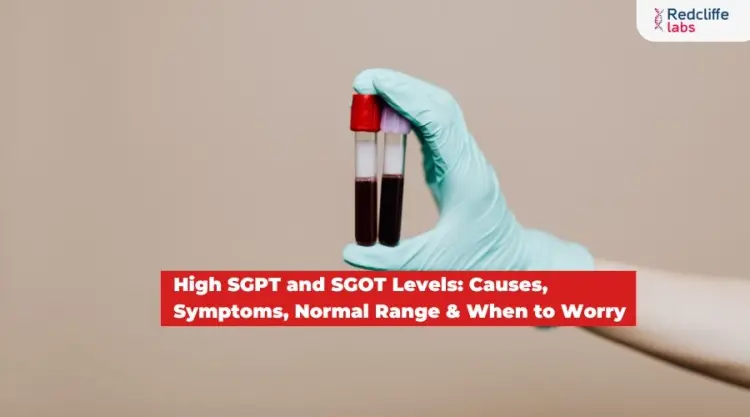The Sodium Test is a vital blood test that measures ...Read more
Blood
Unlock special
discount on
this package
Login to Unlock 🔓
NABL Accredited lab*

Booking Benefits Unlocked Worth FREE 799

Report Consultation

Diet Plan
*Available once your report is generated.
At Redcliffe Labs, we have a single goal: to give India its right to quality diagnostics.
Customers served
Tests Processed Everyday
Cities
Collection Centres
World Class In-house Labs
Home Collection Experts
1 Test Parameters
Sodium
1 PARAMETER INCLUDED
1 PARAMETER INCLUDED
- Sodium
Top Booked Health Checkup Packages
Reports in 12 hours
|Parameters 94
Reports in 12 hours
|Parameters 89
Reports in 12 hours
|Parameters 96
Reports in 12 hours
|Parameters 96
Reports in 12 hours
|Parameters 90
Helps you know your test better
What happens if the sodium is high?
What is the key cause of low sodium levels?
Can an individual recover from low sodium levels?
What are the reasons for high sodium in the body?
Verified by Medical Expert

WRITTEN BY
Sheena Mehta

MEDICALLY REVIEWED BY
Dr. Pradeep Lodha
Table of Content
Introduction to Sodium Test
The sodium test measures the sodium level in the blood. Sodium is a type of electrolyte that is an electrically charged mineral that helps in nerve and muscle function, fluid balance, and maintaining blood pressure. It also helps in coordinated movement, sensation, and vital organ functions like heartbeat and breathing. Consuming too much sodium can disrupt this delicate balance, potentially leading to health concerns like high blood pressure and heart disease. Therefore, maintaining a healthy sodium intake within recommended guidelines is vital.
Abnormal sodium levels can be a sign of various medical conditions, such as dehydration, kidney disease, heart failure, liver disease, adrenal gland disorders, and diabetes. The abnormal sodium levels may cause symptoms like fatigue, headache, nausea, confusion, muscle cramps, seizures, weakness, and more. If you are experiencing these symptoms, consult your doctor for a sodium blood test. You can take the Sodium test from Redcliffe Labs to get accurate and on-time test results. With us, you can book your sodium blood test online, and our professional phlebotomist will come to your place to collect the sample. So, what are you waiting for? Book your sodium test today!
Test details in brief
| Also Known As | Sodium Test, Na Test |
| Purpose | It diagnoses & monitors conditions affecting the body's balance of fluids, electrolytes, & acidity. |
| Preparation | Do not take any over-the-counter medicine without confirming with your Doctor. |
| Fasting | No Fasting Required |
| Get Reports | Within 12 hrs |
| Cost | INR ₹149 |

Purpose of the Sodium Test
The sodium test detects abnormal sodium levels in the blood, including low sodium (hyponatremia) and high sodium (hypernatremia). The test is used to diagnose various conditions, including:
- Assess electrolyte balance- The sodium blood test helps evaluate sodium concentration in the blood, which is crucial for maintaining electrolyte balance.
- Diagnose medical conditions- It aids in diagnosing conditions such as dehydration, hyponatremia (low sodium levels), hypernatremia (high sodium levels), kidney disease, liver disease, heart failure, and certain hormonal imbalances.
- Monitoring Treatment Effectiveness- The test evaluates and monitors the various medical conditions involving the brain, lungs, liver, heart, kidney, thyroid, or adrenal glands. The test allows healthcare providers to monitor the effectiveness of treatments for conditions affecting sodium levels.
- To check your overall health- A sodium test is often included as part of a routine physical exam or blood panel.
- Management of Fluid Balance- Sodium plays a vital role in regulating fluid balance in the body, and the sodium test helps to assess and manage fluid levels to prevent complications related to fluid imbalances.
What does the Sodium test detect?
A sodium test measures the concentration of sodium in your blood. The test does not show any specific diseases, only abnormal sodium levels, which indicate underlying issues affecting your body's electrolyte balance or fluid regulation. Here is what the serum sodium test detects-
- High sodium levels (Hypernatremia)
- It can indicate dehydration, kidney problems, or certain medications.
- Low sodium levels (hyponatremia)
- Measures if your body is dehydrated, electrolyte imbalances due to vomiting, diarrhea, or diuretic use, or underlying conditions like heart failure or liver disease.
Preparation for the Sodium test
The sodium test is a simple blood test requiring no special preparation. Here are the simple steps to follow for preparation for the sodium test-
- Medications- Inform your doctor about the medications and supplements you are taking before the test.
- Fasting- No fasting is mandatory for the sodium blood test; you can eat and drink as usual as per your routine.
Wear comfortable clothes to easily access the arm, and feel free to ask your doctor for any specific instructions related to your condition.
The procedure of the Sodium test
A sodium test is a simple blood test that involves simple steps-
The phlebotomist will first tie a band on the arm area to make the veins more clearer. After that, he will clean the area with an antiseptic solution and insert a needle to collect the blood sample. You might feel a slight prick or pinch when the needle enters. Once enough blood is collected, the needle will be gently removed, and pressure will be applied to the puncture site with a cotton ball or bandage. The sample will then be labeled and sent to the laboratory for analysis.
What is the risk of a Sodium blood test?
The serum sodium test has no or minimal risks. You may experience minor discomfort, such as a brief sting or pinching sensation, when the needle is inserted. Here are some risk factors to note-
- After the blood draw, you might feel slight soreness or tenderness at the puncture site.
- Risk of infection
- Risk of bleeding
- Bruising
- Fainting
- Multiple puncture sites
If you have any concerns or questions about the sodium test procedure, don't hesitate to ask your doctor to take the sodium test.
When Should I Get a Sodium Test?
Whether or not you need a sodium test depends on various factors. Here are some factors-
- Routine health checkups- Your doctor might recommend the test as a part of routine health checkups to assess certain risk factors like high blood pressure or a family history of kidney disease.
- Persisting Symptoms- If you experience abnormal sodium levels, such as excessive thirst or urination, weakness, confusion, fatigue, muscle cramps or twitching, nausea or vomiting, or seizures.
- Monitor health conditions- If you have a condition affecting your electrolyte balance, such as kidney disease, heart failure, or diabetes, your doctor might recommend a sodium test to monitor your sodium levels through blood tests.
What do the Sodium test reports indicate?
The sodium test results will be available within 12 hours of sample collection. Here is what the test reports indicate-
- Normal sodium level- A sodium level within the reference range is considered normal between 135 and 145 milliequivalents per liter (mEq/L).
- High sodium level (hypernatremia)- A higher than 145 mEq/L is considered a high sodium level. The common cause of hypernatremia is not taking enough fluids.
- Low sodium level (hyponatremia)- In case of Hyponatremia or low sodium levels, the sodium levels fall below 135 mEq/L. Chronic diarrhea can cause dehydration, and your body can easily lose electrolytes, such as sodium, and increase ADH levels.
Who is at risk of an Abnormal Sodium Level?
There are several groups of people who are at higher risk of abnormal sodium levels, including:
- People with certain health conditions like kidney disease, heart failure, liver disease, and diabetes are at high risk of abnormal sodium levels.
- People take certain medications like diuretics, certain antidepressants, and antipsychotic medications, NSAIDs.
- People experience symptoms like excessive thirst or urination, confusion, disorientation, weakness, headaches, fatigue, nausea, vomiting, muscle cramps, or seizures.
- Certain age groups of people, including older adults.
- People suffering from heatstroke, severe vomiting or diarrhea, and burns can cause high or low sodium levels.
If you have any concerns about your risk factors or are experiencing symptoms suggestive of an imbalance, consult your doctor for proper evaluation and guidance. Your doctor is the right person to assess your condition and determine the best treatment for you.
What are the common symptoms related to abnormal Sodium tests?
The sodium test alone cannot identify specific diseases; the abnormal results indicate underlying issues affecting your body's electrolyte balance or fluid regulation.
High Sodium Levels (Hypernatremia):
- Thirst
- Less urination
- Dry mouth
- Vomiting
- Seizures
- Headache
- Muscle Weakness and cramps
- Fatigue and lethargy
- Confusion
Low Sodium Levels (Hyponatremia):
- Headaches
- Nausea and vomiting
- Confusion and disorientation
- Weakness and fatigue
- Seizures
If you are noticing any of the above symptoms, then consult your doctor for proper diagnosis and treatment. They will consider your symptoms, medical history, and other test results to determine the cause of your abnormal sodium levels and recommend the appropriate treatment plans.
Sodium Test price at Redcliffe Labs
The Sodium test price at Redcliffe Labs is INR 149. You can book the sodium test online from the Redcliffe Labs app in just one minute. With our express home sample collection services, your sample will be collected in just 45 minutes. Our labs are NABL-accredited and ISO-certified, so you do not need to worry about the quality of the test. You can book your sodium test with us to experience the best diagnostic services at highly competitive prices. We also offer various diagnostic tests, including various blood tests alongside the sodium lab test. Take charge of your health; schedule your sodium test today!

Sodium Test Cost in Different Cities
| City Name | Discounted Price |
| Delhi | ₹149 |
| Noida | ₹149 |
| Mumbai | ₹149 |
| Bangalore | ₹149 |
| Kolkata | ₹149 |
| Pune | ₹149 |
| Lucknow | ₹149 |
| Ahmedabad | ₹149 |
| Hyderabad | ₹149 |
| Chennai | ₹149 |
| Gurgaon | ₹149 |
| Jaipur | ₹149 |
| Faridabad | ₹149 |
| Indore | ₹149 |
| Patna | ₹149 |
Note: We also offer Sodium blood test in other different cities in PAN India. Please call on 8988988787 to check the availability of services in your area.
Sodium Test: Understanding Your Electrolyte Balance
Sodium is an essential mineral that helps to maintain various body functions, like fluid balance, muscle and nerve function, and blood pressure regulation. Abnormal sodium levels signify health problems like kidney disease, diabetes, or heart failure. Early detection through a sodium lab test allows timely intervention and treatment that prevents complications and improves health outcomes. By measuring sodium levels, the test provides valuable insight into your electrolyte balance. It can help to diagnose health issues and understand the cause of symptoms like fatigue, muscle cramps, confusion, and more. The sodium test is a valuable tool for maintaining and monitoring your overall health.
5 Simple Steps to Manage Your Health with Redcliffe Labs
Quick, Simple & Convenient; trusted care delivered to your doorstep.

Start Your Online Booking
Open the Redcliffe Labs website/app. Select the test or package and enter your details. Schedule the service for your preferred slot.

Live Tracking
Stay updated with real-time tracking for a smooth and timely home sample collection.

Sample Collection
Our certified experts ensure a smooth, hygienic, and fully compliant sample collection experience.

Doctor-Verified Smart Reports
Every report is clinically checked by expert doctors and shared with smart, actionable insights.

Your Health Journey Continues Post Reports
Consult with our expert medical team to get actionable insights to improve your health.
Nearby Labs(9)
Redcliffe Labs Noida

MC-5280
Redcliffe Collection Center
Redcliffe Collection Center
Redcliffe Collection Center
Redcliffe Collection Center
Redcliffe Collection Center
Redcliffe Collection Center
Redcliffe Collection Center
Redcliffe Collection Center
Frequently Asked Questions
Why is the Sodium Test Done?
Who should get a Sodium Test done?
What is the purpose of a Sodium Serum test?
What Does Sodium Test Measure?
What do the sodium test results indicate?
What are the risks associated with sodium blood tests?
What are some of the symptoms of sodium imbalance in the body?
Before taking a sodium test, is any special preparation required?
What is the price of a Sodium Test?
Can I book a Sodium Test near me?
Can I book a home collection for a Sodium Test?
Health Articles & Blogs
My Health
Stay informed with our expert health articles and blogs. Explore comprehensive guides on diseases, nutrition, preventive care, and wellness tips to help you make better health decisions.
Why is PCOS Continuously Rising in Women?

10 Healthy Holi Recipes for Your Fitness Goals in 2026
Looking for healthy Holi recipes? Discover 10 festive dishes that support your fitness goals while keeping celebrations delicious.

Importance of Heart Health Before Pregnancy: Everything You Need to Know

Migraine Treatment at Home: Effective Ways to Relieve Migraines Naturally

High SGPT and SGOT Levels: Causes, Symptoms, Normal Range & When to Worry

Brain Hemorrhage Symptoms: Early Warning Signs, Types, Causes & When to Seek Emergency Care

What is SGPT in Blood Reports? Everything You Need to Know

Capsicum (Shimla Mirch) 101: Benefits, Nutritional Value, Uses and More
Explore My Health
